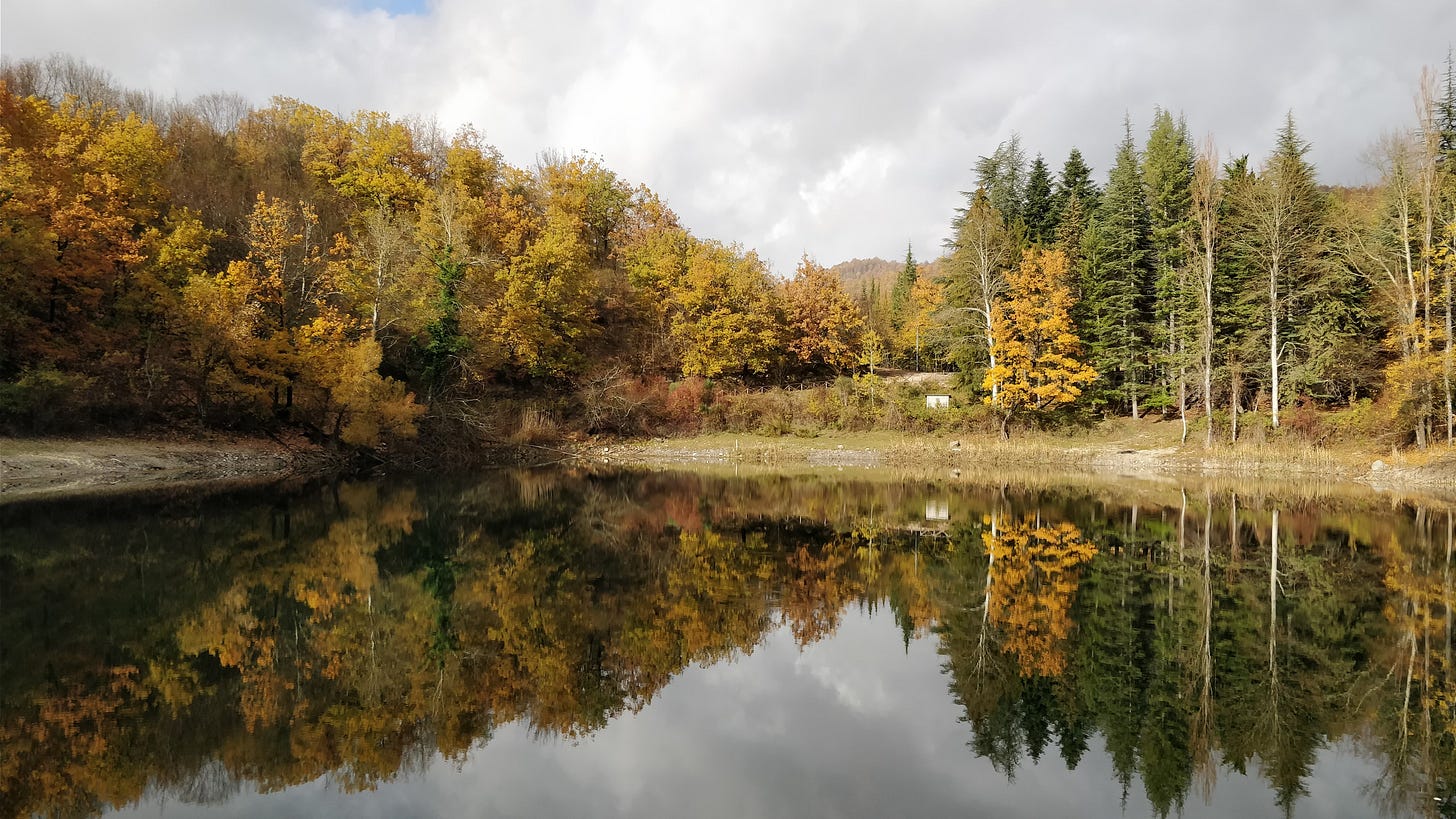A Rainbow of Feelings
Celebrating a rare win for nature in these gloomy times
I’ve been in Brussels for work this week and it’s been…
Fascinating because I got to see some of the EU bureaucracy in action when I attended a stakeholder event.
Terrifying because pretty much every French person I met was. In fact, one said, “If you’re not yet panicking, you should. France is staring down an abyss.”
Exhausting because of a relentless schedule (think 14-hour days). But I can’t blame anyone for this. I wanted to meet many people and take part in many things.
Exhilarating because the Nature Restoration Law passed (which is what this week’s issue is about).
Exhilarating because I met so many like-minded people, including young Polish activists who spoke about staying hopeful even in the darkest of times, and a farmer who’s a one-man organising machine (I hope to write about that visit next week).
Exhilarating because I came away buzzing with ideas of topics to dig deep into, investigate, and write about.
But at my age, there’s only so much excitement I can take. So this is a short-ish one, and the pickings will resume next week.
It was Monday morning and I was feeling frazzled. I woke up to an e-mail from the Eurostar saying my train from Paris to Brussels had been cancelled because of “a last-minute technical issue”. It was sorry for my inconvenience.
Nothing about replacement trains or a phone number I can call to rebook. When I went on the website, the trains before and after mine were already sold out. I bought one of the last eight tickets for the next available train, 90 mins after my original one.
I was cutting it very close to the work event but there was little I could do. So I was already exhausted when I boarded the packed train and wondered at the amount of people in jerseys. Was this the latest French fashion trend?
The jersey-clad travellers were boisterous. It took a while before a light bulb went off: this train was heading to Germany where a certain sports tournament is being held.
But my eyes alighted on a LinkedIn post and my stress over the journey and the apprehension over rowdy football fan behaviour disappeared in a puff of joy.
A Netflix Thriller?
Let’s back up a bit.
The Nature Restoration Law was proposed back in June 2022, as part of a suite of laws under The Green Deal and the EU Biodiversity Strategy to meet Europe’s nature and biodiversity objectives.
At its core, this law aims to restore at least 20% of the EU’s land and sea areas by 2030 and all ecosystems in need of restoration by 2050. This is the first law of its kind in over 20 years, according to the Greens, and is sorely needed.
About 80% of habitats in the EU have “bad” or “poor” conservation status, and only 15% are in “good” condition, the European Environment Agency (EEA) has said.
So you’d think it would be an easy sell, right? Well, you’d be horrendously wrong.
It had a rocky start right from the beginning. Farm lobbies like Copa-Cogeca were dead set against it. In Ireland, a Copa-Cogeca representative, Niall Curly, had to apologise after giving “what turned out to be misleading and incorrect witness evidence to the members of the Joint Oireachtas Committee for Agriculture”.
Countries like The Netherlands, which was struggling with nitrogen pollution mostly caused by industrial-scale agriculture, and Italy, where the big and powerful farm unions and agribusinesses were critical of the law, also opposed it.
It then went through multiple discussions and amendments that included watering down much of the ambitions around agricultural ecosystems. But the EU Parliament finally passed the law in July 2023 after “a knife-edge vote”.
Then, earlier this year, the centre-right European People’s Party, the Parliament’s largest group which added more seats in the most recent election, decided to team up with the right-wing European Conservatives and Reformists and the far-right Identity and Democracy, to kill the bill.
The bill survived. Everyone who cared about the environment breathed a sigh of relief, because there was only one step left before it could take effect: an approval by the council of the EU.
Well, Hungary decided to throw a spanner in the works, and the council vote was postponed.
Until Monday, when environmental ministers at the EU council voted it through.
This law has been in more improbable twists and turns than a third season of a once-loved-but-now-unrealistic Netflix thriller, a veteran environmentalist told me this week.
If you want to know more about the law, Carbon Brief has a good backgrounder.
Going Rouge
So what transpired on Monday? Well, Politico and The Guardian have good takes on it and I have to say, it DOES read like a Netflix thriller.
Politico’s headline says it all: “Rogue Austrian minister burns bridges to save EU nature law”.
Essentially, Austrian Environment Minister Leonore Gewessler “decided at the 11th hour that it was her duty to approve the EU’s Nature Restoration Law... And she knew the decision would lead to a direct showdown with her boss, Austrian Chancellor Karl Nehammer,” Louise Guillot reported.
In a thread on X, the minister said, “My conscience tells me unequivocally: When the healthy and happy lives of future generations are at stake, courageous decisions are needed. That is why I voted for (the law).”
She is paying a heavy political price for it.
“Minutes after the legislation passed, the Austrian chancellor filed a complaint at the Court of Justice of the EU, asking that the vote be annulled. He also filed a complaint against Gewessler personally, alleging she had abused the power of her office and violated the country's constitution,” wrote Politico’s Guillot.
It wasn’t all Gewessler’s doing though.
Last month, Ireland’s Environment Minister Eamon Ryan, a Green, led an effort to convince undecided or opposing countries to back the law. Alain Maron, environment minister for the Brussels-Capital Region and also a Green, was chairing Monday’s meeting. He put the law on the meeting agenda and celebrated its passing.
But Austria’s vote definitely tipped the scales. The law needed a qualified majority of 55% of member states representing at least 65% of the EU population. It passed with 66.07%.
In the end, Italy, Sweden, Finland, Netherlands, Hungary, and Poland voted against it and Belgium abstained, but 20 countries said ‘yes’.
And despite all the hue and cry from Austria, it seems the law is here to stay. ARC2020’s Natasha Foote spoke to legal experts who said it is unlikely the vote will be invalidated.
“Thank You Madam Minister”
This was one of the rare positive outcomes for green groups in what has been a pretty depressing two weeks (and beyond, given that the new parliament, commission, and council are likely to have very low - or no - green ambitions).
Faustine Bas-Defossez, director for nature, health, and environment at the European Environmental Bureau (EEB), the largest network of green organisations in Europe, thanked Gewessler in a LinkedIn Post, saying, “Bravo and thank you Madam Minister, you are an example of leadership that we need more than ever today!”
We are always criticising politicians for focusing on short-term wins and putting the interests of a small group of power brokers above those of the vast majority of people. But we should also applaud and praise them when it is warranted. This is one of those times.
As someone who was born and raised in Burma, I know the dangers of hero-worship, but it is definitely a refreshing change to see politicians who understand that without functioning ecosystems, there won’t be any food production, let alone food sovereignty.
I will admit to being biased but I doubt that jersey competition in Germany has anything as exciting - or relevant to our future generations - as what happened in Brussels this week.
As always, please feel free to share this post and send tips and thoughts on mastodon @ThinInk@journa.host, my LinkedIn page, twitter @thinink, or via e-mail thin@thin-ink.net.





When i opened this u was sure that photo was from Ninfa (north of Rome). How pretty!!